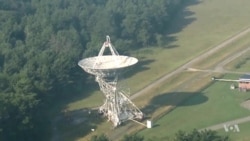Broadband access in the United States is not universal, with a longtime digital divide between urban and rural areas.
But in one small town just four hours from Washington, D.C., there's no Wi-Fi internet service at all.
The town of Green Bank, West Virginia, is the site of the largest fully steerable radio telescope in the world, so Wi-Fi internet connections and anything else that can create electromagnetic waves, such as microwave ovens, are banned.
It becomes apparent in Green Bank that visitors have to navigate the old-fashioned way: by reading road signs. That's because GPS comes to a screeching halt as you approach this West Virginia town, which has two churches, an elementary school, a library and the world's largest radio telescope.
Sherry, who manages the largest store in Green Bank, was born here so the lack of internet access is normal for her.
"Yes, we are different. Many would say that we live the old-fashioned way, in the past. But for us, it's just the way of life that we have always lived," Sherry said.
On her store wall, an artifact from the past ... a phone attached to a wall jack ... the only way to call someone in Green Bank.
No modern wireless conveniences, such as smartphones, are usable here.
Green Bank is frozen in time, somewhere in the 1950s, because there's a 33,000-square-kilometer zone of silence due to the telescope. Cellphone towers are forbidden.
But that's OK for residents because there are several payphones.
The closer you get to the telescope, the greater the restrictions. There's a 16-kilometer radius around the Green Bank Observatory where radio-controlled items, even toys, cannot be used. Compliance with these conditions is strictly enforced.
Radio frequency technician Jonah Bauserman acts as the observatory's "technical" policeman. If he suspects there's an unauthorized signal, he drives to the house and inspects it for prohibited devices.
"This equipment allows me to catch even the weakest signals that could affect the telescope," Bauserman said.
Telescope employees even work in a special room -- much like a sarcophagus -- that blocks electromagnetic waves from leaving the interior.
"Here imagine a submarine, water cannot get inside, and so this room is an electric submarine. No electromagnetic waves can get into this room, just as you can't go beyond it," Michael Holstine, an observatory officer, said.
The job of these scientists is to minimize the impact of outside interference on the radio telescope.
Only once a week, when there's regularly scheduled maintenance, some prohibited devices are allowed near the telescope, Holstine said.
The size of a football field, the telescope is so sensitive it could pick up signals sent from an alien world. And scientists can't wait for that to happen.
"All the signals that we now receive with the help of telescopes are signals that come from cosmic objects -- stars, galaxies. We have not yet received anything from intelligent civilizations," scientist Richard Lynch said.
Local people respect the work of the scientists. And they are more than happy to live life Wi-Fi-free.
"When we want to meet friends, we just call each other on a wire phone. And instead of sitting in front of your screen, we talk, we go fishing, to the mountains," resident Sherry said.
For the latest news, residents read the weekly local newspaper. When she's looking for a phone number, Sherry reaches for the phone book.
And instead of Facebook, Sherry enjoys daily conversations with her customers. In this town, everyone knows each other and communication is face to face.





